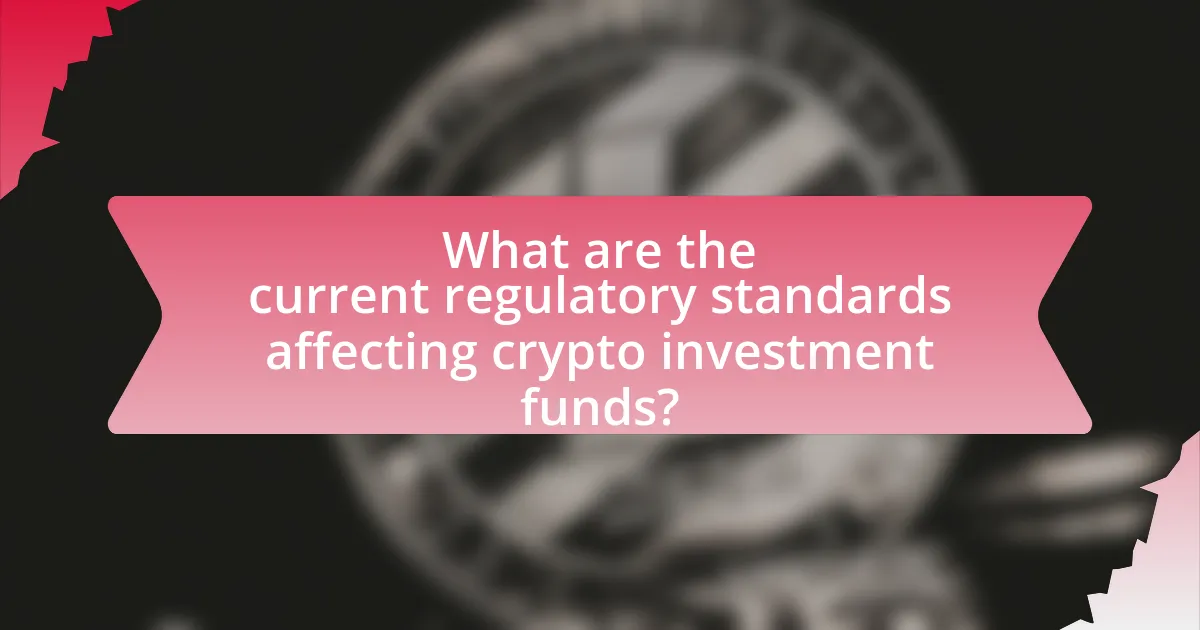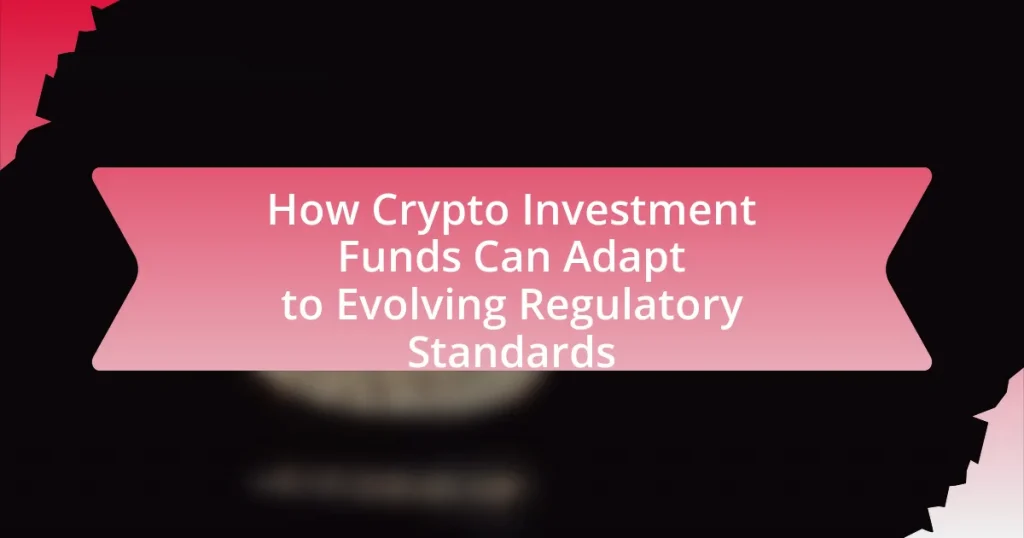Crypto investment funds are increasingly navigating a complex regulatory landscape characterized by varying standards across jurisdictions. Key regulations include compliance with anti-money laundering (AML) and know your customer (KYC) requirements, with significant oversight from bodies such as the SEC in the United States and the FCA in the UK. The article examines how these regulations differ globally, the challenges funds face in compliance, and the common pitfalls to avoid. It also outlines best practices for developing robust compliance frameworks, leveraging technology for regulatory adherence, and the importance of proactive engagement with regulators to ensure operational integrity and investor confidence.

What are the current regulatory standards affecting crypto investment funds?
The current regulatory standards affecting crypto investment funds primarily include compliance with anti-money laundering (AML) and know your customer (KYC) regulations, as mandated by various jurisdictions. In the United States, the Securities and Exchange Commission (SEC) classifies many cryptocurrencies as securities, requiring investment funds to register and adhere to securities laws. In the European Union, the Markets in Crypto-Assets (MiCA) regulation aims to create a comprehensive framework for crypto assets, ensuring investor protection and market integrity. Additionally, the Financial Action Task Force (FATF) guidelines emphasize the need for crypto funds to implement robust AML measures. These standards are designed to mitigate risks associated with fraud, market manipulation, and financial crime, thereby enhancing the legitimacy of crypto investment funds.
How do these regulations vary across different jurisdictions?
Regulations governing crypto investment funds vary significantly across different jurisdictions, reflecting diverse legal frameworks and regulatory approaches. For instance, the United States employs a patchwork of federal and state regulations, with the Securities and Exchange Commission (SEC) focusing on investor protection and classifying many cryptocurrencies as securities. In contrast, the European Union is moving towards a more unified regulatory framework with the Markets in Crypto-Assets (MiCA) regulation, which aims to provide clarity and consistency across member states. Additionally, jurisdictions like Switzerland and Singapore have established more favorable environments for crypto investments, with clear guidelines that encourage innovation while ensuring compliance. These differences highlight the necessity for crypto investment funds to adapt their strategies based on the specific regulatory landscape of each jurisdiction to remain compliant and competitive.
What are the key regulatory bodies involved in crypto investment fund oversight?
The key regulatory bodies involved in crypto investment fund oversight include the Securities and Exchange Commission (SEC) in the United States, the Commodity Futures Trading Commission (CFTC), and the Financial Conduct Authority (FCA) in the United Kingdom. The SEC regulates securities and has jurisdiction over crypto assets classified as securities, while the CFTC oversees derivatives markets, including futures and options on cryptocurrencies. The FCA is responsible for regulating financial markets in the UK, including crypto assets, ensuring compliance with anti-money laundering (AML) and counter-terrorism financing (CTF) regulations. These bodies establish guidelines and frameworks that crypto investment funds must adhere to, ensuring investor protection and market integrity.
How do local laws impact the operation of crypto investment funds?
Local laws significantly impact the operation of crypto investment funds by establishing regulatory frameworks that dictate compliance, reporting, and operational procedures. For instance, jurisdictions like the United States enforce the Securities and Exchange Commission (SEC) regulations, requiring funds to register as investment companies if they offer securities, which affects their ability to raise capital and manage investor relations. Additionally, countries such as Switzerland have developed specific guidelines for crypto assets, allowing funds to operate under a clear legal framework, which can enhance investor confidence and market participation. These legal stipulations can either facilitate or hinder the growth and operational flexibility of crypto investment funds, depending on the regulatory environment in each locality.
What challenges do crypto investment funds face in complying with regulations?
Crypto investment funds face significant challenges in complying with regulations due to the rapidly evolving nature of the regulatory landscape. These funds must navigate a complex web of regulations that vary by jurisdiction, often leading to uncertainty and inconsistency in compliance requirements. For instance, the Financial Action Task Force (FATF) has issued guidelines that require crypto entities to implement anti-money laundering (AML) measures, but the interpretation and enforcement of these guidelines can differ widely among countries. Additionally, the lack of clear regulatory frameworks in many regions creates difficulties in establishing best practices, which can hinder operational efficiency and increase legal risks. Furthermore, the dynamic nature of cryptocurrency markets means that regulations may lag behind technological advancements, complicating compliance efforts for investment funds.
What are the common compliance pitfalls for crypto investment funds?
Common compliance pitfalls for crypto investment funds include inadequate anti-money laundering (AML) procedures, failure to register with regulatory authorities, and insufficient investor due diligence. These funds often overlook the necessity of robust AML frameworks, which can lead to regulatory sanctions; for instance, the Financial Action Task Force (FATF) emphasizes that non-compliance can result in significant penalties. Additionally, many crypto funds neglect to register as investment advisors or securities dealers, exposing them to legal risks, as seen in cases where funds faced enforcement actions for operating without proper licenses. Lastly, insufficient due diligence on investors can lead to violations of Know Your Customer (KYC) regulations, which are critical for preventing fraud and ensuring compliance with financial regulations.
How can funds mitigate the risks associated with regulatory non-compliance?
Funds can mitigate the risks associated with regulatory non-compliance by implementing robust compliance frameworks and conducting regular audits. Establishing a comprehensive compliance program ensures that funds adhere to applicable laws and regulations, thereby reducing the likelihood of violations. Regular audits, both internal and external, help identify potential compliance gaps and allow for timely corrective actions. According to a report by the Financial Action Task Force, organizations with strong compliance measures are less likely to face penalties, highlighting the effectiveness of proactive compliance strategies in minimizing regulatory risks.

How can crypto investment funds adapt to evolving regulatory standards?
Crypto investment funds can adapt to evolving regulatory standards by implementing robust compliance frameworks that align with current laws and regulations. These funds should regularly monitor regulatory developments, engage with legal experts, and participate in industry associations to stay informed about changes. For instance, the Financial Action Task Force (FATF) has established guidelines that require funds to conduct thorough customer due diligence and report suspicious activities, which can serve as a benchmark for compliance. By proactively adjusting their operations to meet these standards, crypto investment funds can mitigate legal risks and enhance their credibility in the market.
What strategies can funds implement to stay compliant?
Funds can implement several strategies to stay compliant with evolving regulatory standards. First, they should establish a robust compliance framework that includes regular audits and assessments to identify and mitigate risks associated with regulatory changes. This framework should incorporate ongoing training for staff to ensure they are aware of the latest regulations and compliance requirements.
Additionally, funds can leverage technology, such as compliance management software, to automate monitoring and reporting processes, which enhances accuracy and efficiency. Engaging with legal and compliance experts can provide insights into regulatory developments and help funds adapt their policies accordingly.
Moreover, maintaining transparent communication with regulators and stakeholders fosters trust and ensures that funds are aligned with regulatory expectations. These strategies are essential for navigating the complex landscape of crypto regulations, as evidenced by the increasing scrutiny from regulatory bodies worldwide.
How can technology assist in regulatory compliance for crypto funds?
Technology can assist in regulatory compliance for crypto funds by automating reporting processes and enhancing data accuracy. Automated systems can track transactions in real-time, ensuring that funds adhere to Anti-Money Laundering (AML) and Know Your Customer (KYC) regulations. For instance, blockchain technology provides an immutable ledger that facilitates transparent auditing and compliance checks. Additionally, machine learning algorithms can analyze transaction patterns to detect suspicious activities, thereby reducing the risk of regulatory breaches. According to a report by the Financial Action Task Force (FATF), the integration of technology in compliance processes can significantly improve the efficiency and effectiveness of regulatory adherence in the crypto sector.
What role does legal counsel play in navigating regulatory changes?
Legal counsel plays a critical role in navigating regulatory changes by providing expert guidance on compliance and risk management. They analyze new regulations, interpret their implications for crypto investment funds, and advise on necessary adjustments to business practices. For instance, legal counsel helps funds understand the requirements set forth by regulatory bodies such as the SEC or CFTC, ensuring that they adhere to laws governing securities and anti-money laundering. This expertise is essential for mitigating legal risks and maintaining operational integrity in a rapidly evolving regulatory landscape.
Why is proactive engagement with regulators important for crypto funds?
Proactive engagement with regulators is crucial for crypto funds to ensure compliance and foster a stable operating environment. By actively communicating with regulatory bodies, crypto funds can better understand evolving regulations, which helps mitigate legal risks and avoid potential penalties. For instance, the Financial Action Task Force (FATF) has issued guidelines that require crypto funds to implement anti-money laundering (AML) measures; funds that engage with regulators can more effectively align their practices with these requirements. Furthermore, proactive engagement can enhance a fund’s reputation, as it demonstrates a commitment to transparency and responsible governance, which is increasingly valued by investors and stakeholders in the crypto space.
How can funds build relationships with regulatory bodies?
Funds can build relationships with regulatory bodies by engaging in proactive communication and transparency. Establishing regular dialogue with regulators allows funds to understand regulatory expectations and share their operational practices. For instance, funds can participate in industry forums and consultations, which not only demonstrate their commitment to compliance but also provide valuable insights into regulatory developments. Additionally, maintaining a transparent reporting process helps build trust, as evidenced by the increased cooperation seen in jurisdictions where funds have adopted open communication strategies with regulators.
What are the benefits of participating in industry advocacy groups?
Participating in industry advocacy groups provides significant benefits, including enhanced influence on regulatory policies and improved networking opportunities. These groups allow members to collectively voice concerns and advocate for favorable regulations, which is crucial in the rapidly evolving landscape of cryptocurrency investment. For instance, the Blockchain Association has successfully lobbied for clearer regulations that benefit the crypto industry, demonstrating the power of collective advocacy. Additionally, members gain access to valuable resources, industry insights, and best practices that can help them navigate compliance challenges effectively.

What best practices should crypto investment funds follow to ensure compliance?
Crypto investment funds should implement robust compliance frameworks that include thorough Know Your Customer (KYC) procedures, regular audits, and adherence to Anti-Money Laundering (AML) regulations. KYC processes help verify the identity of investors, ensuring that funds are not used for illicit activities. Regular audits by independent firms provide transparency and accountability, which are critical in maintaining investor trust and meeting regulatory expectations. Furthermore, compliance with AML regulations, which require monitoring and reporting suspicious transactions, is essential for preventing financial crimes. These practices are supported by regulatory bodies like the Financial Action Task Force (FATF), which emphasizes the importance of compliance in the crypto sector to mitigate risks associated with money laundering and terrorist financing.
How can funds develop a robust compliance framework?
Funds can develop a robust compliance framework by implementing a comprehensive risk assessment process, establishing clear policies and procedures, and ensuring ongoing training and monitoring. A thorough risk assessment identifies potential regulatory risks specific to the fund’s operations, allowing for tailored compliance measures. Clear policies and procedures provide a structured approach to compliance, ensuring that all employees understand their responsibilities and the regulatory requirements they must meet. Ongoing training keeps staff updated on evolving regulations, while regular monitoring and audits help to identify and rectify compliance gaps. According to a report by the Financial Action Task Force, effective compliance frameworks significantly reduce the risk of regulatory breaches and enhance the fund’s reputation in the market.
What key components should be included in a compliance program?
A compliance program should include key components such as risk assessment, policies and procedures, training and education, monitoring and auditing, reporting mechanisms, and enforcement and discipline. Risk assessment identifies potential compliance risks specific to the organization, while policies and procedures provide clear guidelines for compliance. Training and education ensure that employees understand their responsibilities, and monitoring and auditing help evaluate the effectiveness of the compliance program. Reporting mechanisms allow for the reporting of compliance issues, and enforcement and discipline ensure accountability for violations. These components are essential for maintaining adherence to regulatory standards, particularly in the evolving landscape of crypto investment funds.
How often should compliance policies be reviewed and updated?
Compliance policies should be reviewed and updated at least annually. This frequency ensures that the policies remain aligned with evolving regulatory standards and industry best practices. Additionally, significant changes in laws, regulations, or business operations may necessitate more frequent reviews to mitigate risks effectively. Regular updates help organizations maintain compliance and avoid potential legal penalties, as highlighted by the U.S. Department of Justice’s guidance on compliance programs, which emphasizes the importance of continuous monitoring and improvement.
What are the common mistakes to avoid in regulatory compliance?
Common mistakes to avoid in regulatory compliance include failing to stay updated on regulations, inadequate training for employees, and neglecting proper documentation. Staying informed about evolving regulations is crucial, as non-compliance can lead to significant penalties; for instance, the Financial Action Task Force (FATF) updates its guidelines regularly, impacting crypto regulations globally. Inadequate training can result in employees not understanding compliance requirements, which was highlighted in a 2021 study by the Association of Certified Financial Crime Specialists, showing that 60% of compliance failures stem from insufficient staff training. Lastly, neglecting documentation can hinder the ability to demonstrate compliance during audits, as evidenced by numerous enforcement actions where firms faced fines due to lack of proper records.
How can funds ensure they are not overlooking critical regulatory updates?
Funds can ensure they are not overlooking critical regulatory updates by implementing a robust compliance framework that includes regular monitoring of regulatory changes, engaging with legal experts, and utilizing technology for real-time updates. A compliance framework allows funds to systematically track and analyze new regulations, while legal experts provide insights into complex legal language and implications. Additionally, technology solutions, such as regulatory technology (RegTech), can automate the monitoring process, ensuring that funds receive timely alerts about relevant changes. According to a report by Deloitte, firms that leverage RegTech can reduce compliance costs by up to 30%, demonstrating the effectiveness of these strategies in maintaining regulatory compliance.
What resources are available for staying informed about regulatory changes?
To stay informed about regulatory changes, individuals and organizations can utilize several key resources. Government websites, such as the U.S. Securities and Exchange Commission (SEC) and the Financial Conduct Authority (FCA) in the UK, provide official updates on regulations affecting financial markets, including cryptocurrency. Industry associations, like the Blockchain Association and the Global Digital Finance, offer insights and advocacy on regulatory matters. Additionally, legal and financial news outlets, such as Bloomberg and Reuters, frequently report on regulatory developments. Subscribing to newsletters from these sources ensures timely updates. Research studies, such as those published by the Cambridge Centre for Alternative Finance, also analyze regulatory trends and their implications for the crypto sector.
What practical steps can crypto investment funds take to adapt to regulatory changes?
Crypto investment funds can adapt to regulatory changes by implementing robust compliance frameworks. These frameworks should include regular audits, the establishment of clear internal policies, and ongoing training for staff on regulatory requirements. For instance, funds can utilize compliance software to monitor transactions and ensure adherence to Anti-Money Laundering (AML) and Know Your Customer (KYC) regulations, which are critical in the evolving regulatory landscape. Additionally, engaging with legal experts and regulatory bodies can provide insights into upcoming changes, allowing funds to proactively adjust their strategies. This approach is supported by the fact that funds that prioritize compliance are more likely to maintain investor trust and avoid legal penalties, as evidenced by the increasing number of regulatory actions against non-compliant entities in the crypto space.















